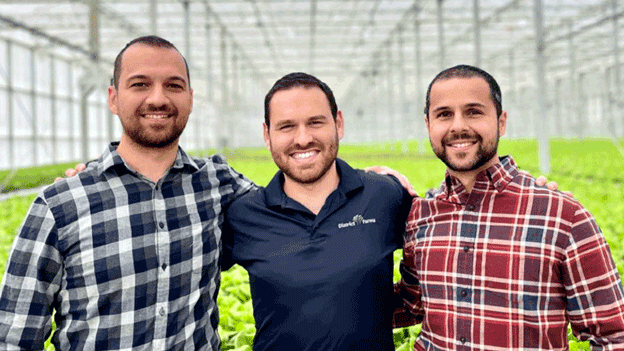Hydroponic farming, a method of growing plants without soil, has rapidly gained traction as a solution to the resource challenges faced by traditional agriculture. The Sharifzadeh brothers and their partner Jason Stern, founders of District Farms in Frederick, Maryland, are at the forefront of this movement. Established in 2017, District Farms utilizes greenhouse hydroponic farming to grow leafy greens, including butterhead lettuce, romaine, and a unique trio lettuce pod. This method allows them to conserve water, use less land, and provide fresh, pesticide-free produce year-round.
Hydroponic farming, technically referred to as controlled environmental agriculture (CEA), focuses on optimizing the elements plants need to thrive—light, water, and carbon dioxide. Unlike traditional farms, which rely on open fields and natural weather patterns, hydroponic farms like District Farms grow their crops indoors using advanced systems. The Sharifzadeh brothers’ operation employs a closed-loop system where water is continuously recirculated.
This system reduces water usage by as much as 95% compared to traditional outdoor farms. The remaining water that plants do not absorb is collected, filtered, treated, and recirculated, making the farm highly resource-efficient. According to District Farms’ website, the hydroponic method also uses less than 10% of the land required by conventional farming methods for the same output, making it an attractive option for urban and peri-urban areas where land is scarce.
The growing process at District Farms begins with seeding, after which the plants are moved to a germination area. As they develop, they are transferred to a section with growing troughs that use the Nutrient Film Technique (NFT). Nutrient-rich water flows through gutters or troughs, nourishing the plants from the roots as it moves through the system. This method ensures that the plants receive the exact nutrients they need while minimizing waste.
In December 2022, District Farms completed a major expansion, growing the facility to 5.1 acres, including a four-acre indoor farm and additional space for processing and cold storage. The expansion has allowed the farm to increase production, meeting growing demand for locally grown, fresh, and sustainably produced leafy greens. The farm’s products, which include whole heads of lettuce (with and without roots) and pre-cut lettuce, are distributed through Mastronardi Produce, a well-known supplier of greenhouse-grown vegetables.
One of the main benefits of hydroponic farming is the ability to grow crops in a controlled environment, free from pests and unpredictable weather conditions. District Farms’ greenhouse remains warm and productive even during the harshest winters, ensuring that crops continue to grow without interruption. This consistent environment allows for more predictable harvests and higher yields, a key advantage over traditional farming.
Looking ahead, District Farms has plans for further expansion. One option includes growing the current site in Frederick to 10 acres, which would maximize the facility’s capacity. Another possibility is establishing a second location, potentially within the region, to expand operations and meet increasing demand for hydroponic produce.
Hydroponic farming, as demonstrated by District Farms, represents a sustainable and efficient alternative to traditional farming. With its ability to significantly reduce water usage, land needs, and the use of pesticides, hydroponics offers a promising solution for addressing the challenges of food production in an era of climate change and resource scarcity. As District Farms continues to grow, its innovative approach could serve as a model for the future of agriculture, providing fresh, local produce with a fraction of the environmental impact.












